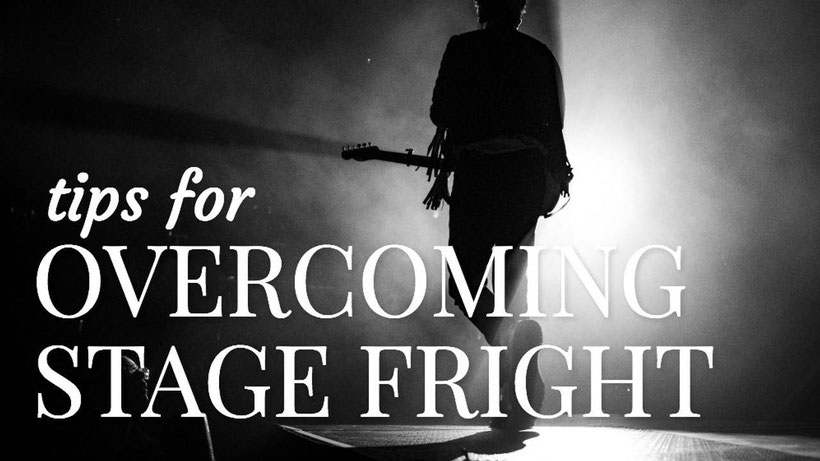“The problem is not the sensation of nerves in your body, the problem is that you've decided to interpret them as fear, as an indication you can't cope or you're gonna mess up. That's not what it is. It's your personality subtly transforming from the normal, everyday you, into the slightly more special version of you required for this special situation”. - Jon Gomm, acoustic guitar virtuoso
Stage fright, like all human reactions (and emotions), is a psycho-physical reaction. I'm paraphrasing, but FM Alexander said of his Technique that it was learning to deal with the stimulus of living, and being on stage is a big stimulus.
A bit of expectation management, the goal here isn't being able to prevent feeling nervous. Being nervous is perfectly normal, and an acceptable response to the situation of playing live. As acoustic maestro Jon Gomm has commented on his own stage fright, he considers his nervousness a sign of his super powers coming on board. A lack of nerves is also commonly associated with a lacklustre performance.
Although stage fright is a strong emotion, it's important to understand that emotions aren't thoughts, and as such, you can't think your way out of them. You've probably experienced this in various ways throughout your life. You can't think your way out of love or fear in the moment. Gestalt Therapy, which is a form of psychotherapy, shares the same understanding of psychophysical unity as the Alexander Technique. Clients are encouraged to fully experience the physicality of their emotional states to help process them better, and that's also good way into dealing with stage fright too.

By tangibly addressing the physicality rather than your mental state, you'll find the latter becomes more manageable, but what are the physical traits? They're the same as you'd expect to find in all reactions, a tightening of the neck and shoulder muscles specifically and interference with breathing. There's actually a general tightening of muscles but the neck and shoulder muscles are a useful barometer and window into dealing with the overall condition. It should be obvious that all the things we discussed previously with regards to poise/posture are equally relevant here such is the nature of psycho-physicality.
A good place to start is to take long out breaths to encourage your parasympathetic nervous system, your resting state, and become aware of your peripheral vision to discourage over concentration of the mind. And as previously mentioned, being aware of your periphereal vision is a practical way of reducing mental concentration. Then, look for the support of the ground pushing up through your feet so that your spine pushes your head "forward and up", allowing your neck muscles to release into the direction that provides. Allow the shoulders to hang down your back by directing the chest muscles to release into width. Don't concern yourself with how successful you are in directing, it's somewhat of a wish, a desire, be content with the desire itself.
Alexander countered against the use of imagery because you never know what someone is going to do with it, people can respond very differently to the same imagery. I'm aware that imagery is often offered and used in dealing with stage fright, and if you've found one that works for you feel free to keep using it alongside the above recommendations.
There’s an interesting relationship between emotion and gesture, and the way we associate strong emotions with tension. Entire books have been dedicated to it, but for now it’s helpful to recognise that, thankfully, tension isn’t always intrinsic to the emotion. If that was the case the act of wanting to communicate strong emotions would hinder your ability to do so on the guitar. When watching others perform, don’t associate emotional facial expressions AKA “guitar face” with performance hindering physical tension.
I’ll bookend this with more wise words from Jon Gomm;
"I find that maintaining confidence is like trying to hold water in your bare hands. Conviction is much easier to hold on to, and from there, confidence can sometimes grow on its own ... And when fear realises it can't win, it seems to give up."
𝗧𝗵𝗲 𝘀𝗲𝗰𝗿𝗲𝘁𝘀 𝘁𝗼 𝗽𝗮𝗶𝗻-𝗳𝗿𝗲𝗲 𝗽𝗹𝗮𝘆𝗶𝗻𝗴, 𝗽𝗲𝗿𝗳𝗲𝗰𝘁 𝗽𝗼𝘀𝘁𝘂𝗿𝗲, 𝗿𝗲𝗱𝘂𝗰𝗲𝗱 𝘁𝗲𝗻𝘀𝗶𝗼𝗻 𝗮𝗻𝗱 𝗶𝗺𝗽𝗿𝗼𝘃𝗲𝗱 𝗽𝗲𝗿𝗳𝗼𝗿𝗺𝗮𝗻𝗰𝗲.
Effortless Guitar book available from Amazon. Read the 5 star reviews.

Write a comment